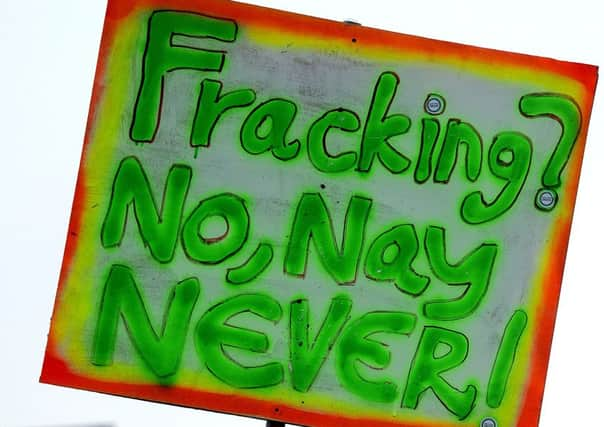Scottish Parliament votes for outright ban on fracking


The SNP announced a moratorium on fracking in Scotland last January, but stopped short of an outright ban to allow further consultation and a public health impact assessment to be carried out.
Scottish Labour had tabled an amendment in support of a full ban as part of an environment debate headed by the new cabinet secretary Roseanna Cunningham yesterday.
Advertisement
Hide AdAdvertisement
Hide AdAfter SNP members abstained, the amendment was passed by 32 votes to 29, with Scottish Greens and Liberal Democrats teaming up with Labour to defeat the Conservatives.
The vote does not create a binding policy of fracking and after the result, Labour MSPs demanded the SNP clarify its position on the fracking issue – would they respect the will of parliament and introduce an outright ban on fracking or ignore the vote completely?
Falkirk East MSP Angus MacDonald and Falkirk West MSP Michael Matheson both abstained from the vote.
Mr MacDonald said: “This is not the final vote on fracking. The decision on whether fracking will take place in Scotland will be made once the full public health study and the full public consultations have taken place, which is the responsible and proper way to conduct this serious issue.
Advertisement
Hide AdAdvertisement
Hide Ad“Perversely, the amendments in Parliament yesterday would bring the prospect of fracking happening closer as a judicial review would be more likely if an immediate ban was introduced.
“We are taking a much more sensible approach to fracking than Labour’s cynical attempts to grab headlines. We remain deeply sceptical about fracking and have ensured that no fracking can take place in Scotland by putting in place a moratorium.
“The Scottish Government have also put in place a very thorough research programme and plans for a public consultation, so that any decision is based on both evidence and public opinion.
“If we are to ban fracking we need to have a strong, robust case to meet any legal challenge to any decision taken by the Scottish Parliament or the Scottish Government.
Advertisement
Hide AdAdvertisement
Hide Ad“I can assure you that unless it can be proven beyond doubt that there is no risk to health, communities or the environment, there will be no fracking or UCG extraction in Scotland.”
Grangemouth petrochemical giant Ineos has invested heavily in fracking over the last year, buying up land in the local area earmarked for drilling.
An Ineos spokesperson said: “The vote yesterday changes very little. A process remains in place in Scotland to further assess scientific, evidence based research before a decision is taken on fracking.
“This has important implications for the people of Scotland and its economy and should not be prejudged before it has reached its conclusion. Ineos has been clear that it believes shale gas can be extracted safely and that Scotland is losing out as the centre of excellence moves south.
Advertisement
Hide AdAdvertisement
Hide Ad“We are focused on England where we believe that shale can provide much needed jobs, investment and energy security.”
UKOOG, the representative body for UK onshore oil and gas, was disappointed by the vote.
Ken Cronin, UKOOG chief executive, said: “The Scottish Government announced a process in January 2015 which included a research phase and then a public consultation phase. This is not due to finish until the summer of 2017.
“UKOOG and its members have been participating in this process from the beginning and will continue to do so. The process is meant to present the facts to the Scottish people and so we are disappointed today to see that some within the Scottish parliament are trying to derail it.
Advertisement
Hide AdAdvertisement
Hide Ad“We are confident as an industry based on over 50 years of experience both onshore and offshore that hydraulic fracturing can be done safely and environmentally sensitively within the regulatory environment in Scotland.
“We have had a well regulated industry in Scotland for many decades. We have drilled over 30 wells in the last 20 years. One of the first hydraulic fractures in the UK took place in Airdrie nearly 50 years ago and fracking also took place inside the Glasgow city boundary in 1989 at Easterhouse.
“The Oil and Gas Industry has made a huge contribution to the economy of Scotland. Onshore gas and oil will benefit the Scottish economy, not only directly, with jobs created through oil and gas extraction, but also indirectly, as oil and gas is a critical raw material for the chemicals industry at facilities such as Grangemouth.”